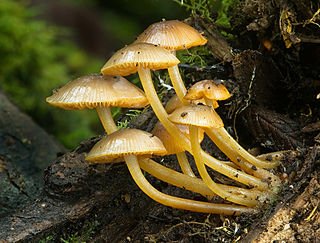
Mycology is the branch of biology concerned with the study of fungi, including their taxonomy, genetics, biochemical properties, and use by humans. Fungi can be a source of tinder, food, traditional medicine, as well as entheogens, poison, and infection. Mycology branches into the field of phytopathology, the study of plant diseases. The two disciplines are closely related, because the vast majority of plant pathogens are fungi. A biologist specializing in mycology is called a mycologist.

Thyme is a culinary herb consisting of the dried aerial parts of some members of the genus Thymus of flowering plants in the mint family Lamiaceae. Thymes are native to Eurasia and north Africa. Thymes have culinary, medicinal, and ornamental uses. The species most commonly cultivated and used for culinary purposes is Thymus vulgaris, native to Southeast Europe.

Clupeiformes is the order of ray-finned fish that includes the herring family, Clupeidae, and the anchovy family, Engraulidae. The group includes many of the most important forage and food fish.

Trivial Pursuit is a board game in which winning is determined by a player's ability to answer trivia and popular culture questions. Players move their pieces around a board, the squares they land on determining the subject of a question they are asked from a card. Each correct answer allows the player's turn to continue; a correct answer on one of the six "category headquarters" spaces earns a plastic wedge which is slotted into the answerer's playing piece. The object of the game is to collect all six wedges from each "category headquarters" space, and then return to the center "hub" space to answer a question in a category selected by the other players.
2024 (MMXXIV) is the current year, and is a leap year starting on Monday of the Gregorian calendar, the 2024th year of the Common Era (CE) and Anno Domini (AD) designations, the 24th year of the 3rd millennium and the 21st century, and the 5th year of the 2020s decade.

Penstemon, the beardtongues, is a large genus of roughly 280 species of flowering plants native to North America from northern Canada to Central America. It is the largest genus of flowering plants endemic to North America. As well as being the scientific name, penstemon is also widely used as a common name for all Penstemon species alongside beardtongues.

Sambucus is a genus of flowering plants in the family Adoxaceae. The various species are commonly referred to as elder, elderflower or elderberry.

Iridaceae is a family of plants in order Asparagales, taking its name from the irises. It has a nearly global distribution, with 69 accepted genera with a total of c. 2500 species. It includes a number of economically important cultivated plants, such as species of Freesia, Gladiolus, and Crocus, as well as the crop saffron.
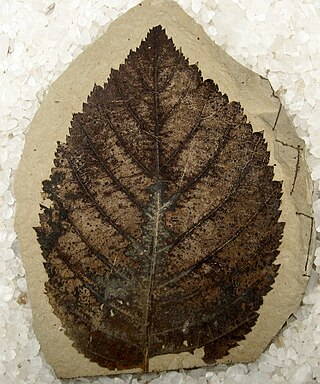
Paleobotany, also spelled as palaeobotany, is the branch of botany dealing with the recovery and identification of plant remains from geological contexts, and their use for the biological reconstruction of past environments (paleogeography), and the evolutionary history of plants, with a bearing upon the evolution of life in general. A synonym is paleophytology. It is a component of paleontology and paleobiology. The prefix palaeo- or paleo- means "ancient, old", and is derived from the Greek adjective παλαιός, palaios. Paleobotany includes the study of terrestrial plant fossils, as well as the study of prehistoric marine photoautotrophs, such as photosynthetic algae, seaweeds or kelp. A closely related field is palynology, which is the study of fossilized and extant spores and pollen.

Echinops is a genus of about 130 species of flowering plants in the family Asteraceae, commonly known as globe thistles. They have spiny foliage and produce blue or white spherical flower heads. They are distributed from central Asia, Mongolia and north-eastern China to the Mediterranean basin, temperate regions of Eurasia, reaching to Indian subcontinent and tropical Africa. Globe thistle is the host plant of weevils Larinus vulpes and Larinus onopordi.
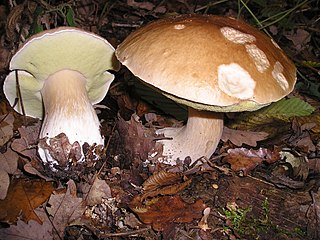
A bolete is a type of mushroom, or fungal fruiting body. It can be identified thanks to a unique cap. On the underside of the cap there is usually a spongy surface with pores, instead of the gills typical of mushrooms. A similar pore surface is found in polypores, but these species generally have a different physical structure from boletes, and have different microscopic characteristics than boletes. Many polypores have much firmer, often woody, flesh.

The 5000 metres or 5000-metre run is a common long-distance running event in track and field, approximately equivalent to 3 miles 188 yards or 16,404 feet 2 inches. It is one of the track events in the Olympic Games and the World Championships in Athletics, run over 12+1⁄2 laps of a standard track. The same distance in road running is called a 5K run; referring to the distance in metres rather than kilometres serves to disambiguate the two events. The 5000 m has been present on the Olympic programme since 1912 for men and since 1996 for women. Prior to 1996, women had competed in an Olympic 3000 metres race since 1984. The 5000 m has been held at each of the World Championships in Athletics in men's competition and since 1995 in women's.
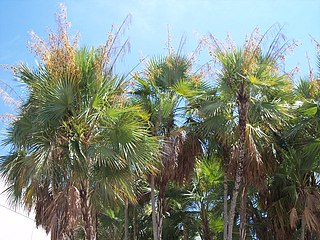
Acoelorraphe is a genus of palms with a single species Acoelorraphe wrightii, known as the Paurotis palm, Everglades palm or Madeira palm in English and cubas, tique, and papta in Spanish. The genus name is sometimes spelt as Acoelorrhaphe or Acoelorhaphe, which are treated by orthographical variants by the International Plant Names Index.

Anisodactylus is a genus of ground beetle native to the Palearctic, the Near East and North Africa.
Gundlachia, commonly called goldenshrub, is a genus of flowering plants in the family Asteraceae.

Amanita crocea, the saffron ringless amanita, is a species of Amanita widely distributed in Europe. It is not recommended for consumption due to its similarity to poisonous species of the genus.

Gracilia is a genus of longhorn beetles in the family Cerambycidae. This genus has a single species, Gracilia minuta. It is native to Europe and has been introduced to the United States, Argentina, and Uruguay.

The 2026 FIFA World Cup, marketed as FIFA World Cup 26, will be the 23rd FIFA World Cup, the quadrennial international men's soccer championship contested by the national teams of the member associations of FIFA. The tournament will take place from June 11 to July 19, 2026. It will be jointly hosted by 16 cities in three North American countries: Canada, Mexico, and the United States. The tournament will be the first hosted by three nations and the first North American World Cup since 1994. Argentina is the defending champion.
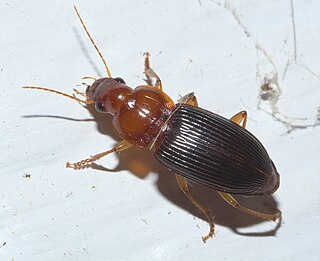
Harpalini is a tribe of a diverse group of ground beetles belonging to the subfamily Harpalinae within the broader family Carabidae. The tribe contains more than 1,900 species.
















